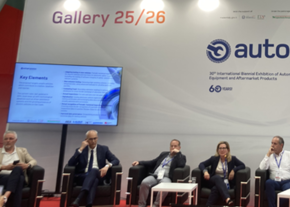
18/02/2019
Policy event in Brussels with MEPs and committee members
Massimo Brunamonti
The European Commission continues to seek solutions for the long-standing problem of access to technical data
The European Commission continues to seek solutions for the long-standing problem of access to technical data, which will have to be examined in September 2019 after the spring elections.
The importance of the subject matter prompted EGEA, along with the other members of the Alliance for Freedom in Car Repair (AFCAR), to arrange a “Policy Lunch” held in Brussels on November 20, 2018 (https://www.direct-access.eu/policy-event-2018/), in an attempt to raise awareness among MEPs and members of the Commission. In addition to AFCAR members (EGEA, FIGIEFA, CECRA, AIRC, ADPA and FIA), several other associations representing the whole sector were also present at the event: CITA (the International Association of Inspection Tests Organisations), ETRMA (the European Tyre and Rubber Manufacturers’ Association), Insurance Europe (the Association of Insurers) and SME United (representing Artisans and Small Businesses). All participants were clearly informed about the need to protect the consumers’ freedom of choice in a "connected car" scenario.
The central speeches were by Eddy Hartog, Head of Department at DG Connect of the European Commission and Wim Van de Camp, Member of the European Parliament and Head of the Transport Commission; both, active in the so-called "third mobility package", stressed the need to ensure, throughout Europe, an "ecosystem" made up of 5G connections, cyber-security and data access, thus keeping the European industry at the forefront of connected mobility. Among other presentations, the EU Commission’s JRC (Joint Research Centre), illustrated the economic impact generated by different data exchange platform and data access solutions.
The event then focused on the results of a study, partly funded by EGEA and carried out by Knobloch&Gröhn, an independent agency, which exposed the "truth behind the Extended Vehicle myth". The ExVe model has been proposed by vehicle manufacturers as a "fair" access protocol to vehicle data, but the study presented convincing details and evidence of how few vehicle manufacturers are actually implementing ExVe and especially how few diagnostic data are actually available through the ExVe protocol. The study also showed how other vehicle manufacturers are adopting on-board platforms (an example is the SDL consortium which includes Ford and Toyota) or making greater use of apps such as Apple CarPlay or Android Auto to provide, unlike ExVe, access to on-board data for their RMI services.
Following the presentations, a round table focused on the results of the Knobloch&Gröhn's study and possible responses to the key points identified by Eddy Hartog, Wim van de Camp and JRC. The focus of all panel participants was on the need for an urgent and comprehensive legislative framework regulating data access and vehicle functions in order to ensure effective and undistorted competition.
To sum up the situation, Neil Pattemore of EGEA, on behalf of MEP Arndt Kohn, unfortunately absent due to illness, concluded by inviting the legislators to preserve the principles of open and free access to OBD connection with direct, real-time, standardised and free access, mandating that such requirements be guaranteed also in a future standardised, interoperable and safe vehicle platform.
The importance of the subject matter prompted EGEA, along with the other members of the Alliance for Freedom in Car Repair (AFCAR), to arrange a “Policy Lunch” held in Brussels on November 20, 2018 (https://www.direct-access.eu/policy-event-2018/), in an attempt to raise awareness among MEPs and members of the Commission. In addition to AFCAR members (EGEA, FIGIEFA, CECRA, AIRC, ADPA and FIA), several other associations representing the whole sector were also present at the event: CITA (the International Association of Inspection Tests Organisations), ETRMA (the European Tyre and Rubber Manufacturers’ Association), Insurance Europe (the Association of Insurers) and SME United (representing Artisans and Small Businesses). All participants were clearly informed about the need to protect the consumers’ freedom of choice in a "connected car" scenario.
The central speeches were by Eddy Hartog, Head of Department at DG Connect of the European Commission and Wim Van de Camp, Member of the European Parliament and Head of the Transport Commission; both, active in the so-called "third mobility package", stressed the need to ensure, throughout Europe, an "ecosystem" made up of 5G connections, cyber-security and data access, thus keeping the European industry at the forefront of connected mobility. Among other presentations, the EU Commission’s JRC (Joint Research Centre), illustrated the economic impact generated by different data exchange platform and data access solutions.
The event then focused on the results of a study, partly funded by EGEA and carried out by Knobloch&Gröhn, an independent agency, which exposed the "truth behind the Extended Vehicle myth". The ExVe model has been proposed by vehicle manufacturers as a "fair" access protocol to vehicle data, but the study presented convincing details and evidence of how few vehicle manufacturers are actually implementing ExVe and especially how few diagnostic data are actually available through the ExVe protocol. The study also showed how other vehicle manufacturers are adopting on-board platforms (an example is the SDL consortium which includes Ford and Toyota) or making greater use of apps such as Apple CarPlay or Android Auto to provide, unlike ExVe, access to on-board data for their RMI services.
Following the presentations, a round table focused on the results of the Knobloch&Gröhn's study and possible responses to the key points identified by Eddy Hartog, Wim van de Camp and JRC. The focus of all panel participants was on the need for an urgent and comprehensive legislative framework regulating data access and vehicle functions in order to ensure effective and undistorted competition.
To sum up the situation, Neil Pattemore of EGEA, on behalf of MEP Arndt Kohn, unfortunately absent due to illness, concluded by inviting the legislators to preserve the principles of open and free access to OBD connection with direct, real-time, standardised and free access, mandating that such requirements be guaranteed also in a future standardised, interoperable and safe vehicle platform.






